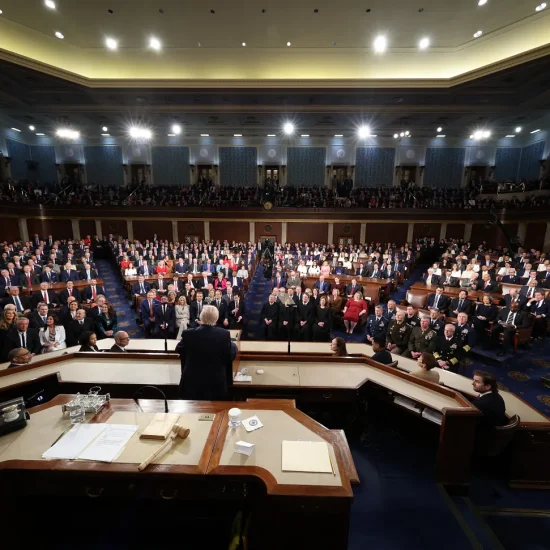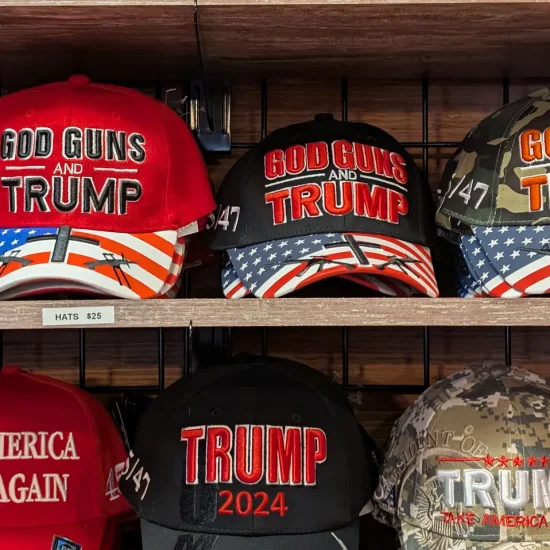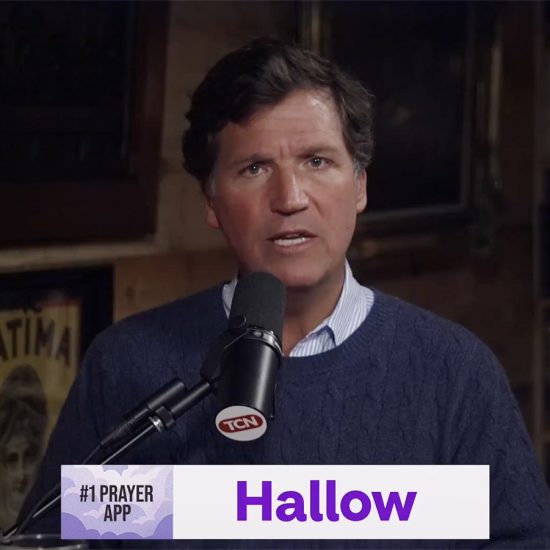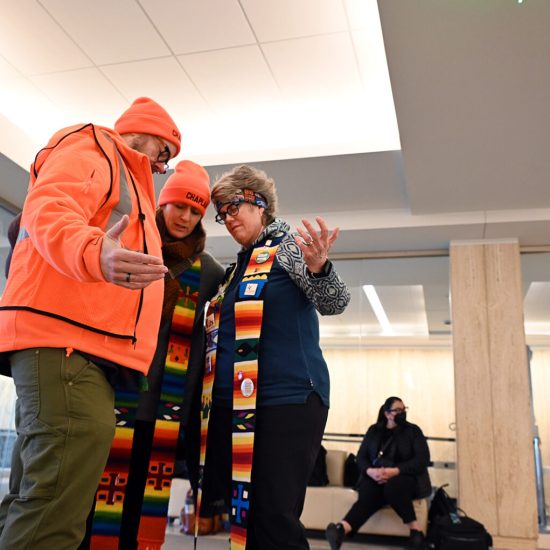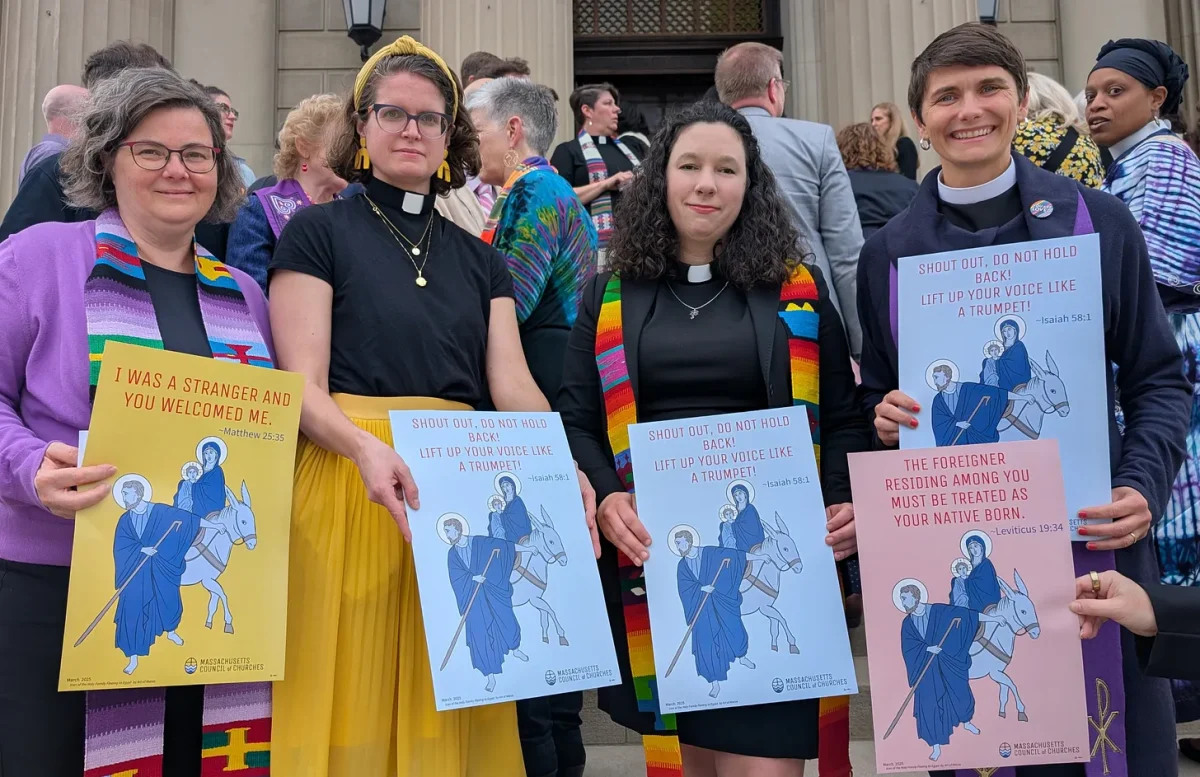
NOTE: This piece was originally published at our Substack newsletter A Public Witness.
“It’s alright to pray for lawyers. It’s alright to clap for lawyers — even in church.”
Rev. Jim Wallis offered that quip as he stood in the pulpit of National City Christian Church in Washington, D.C., on Thursday (April 3) during a vigil on the eve of a legal hearing. The next morning, a judge heard arguments in a case where 27 religious groups are suing the U.S. Department of Homeland Security to block Immigration and Customs Enforcement agents from conducting raids in houses of worship after a policy change by the Trump administration. During the vigil organized by many of the plaintiff groups, Wallis expressed prayer for their attorneys to be “guided by wisdom, by strength, and the unwavering pursuit of justice.” To applause, he named the attorneys before adding it was okay to pray for lawyers.
“We lift up our prayers, not just for the outcome of a lawsuit — we do that — but also for the families who are directly impacted by these injustices, for the children who go to school afraid every day,” added Wallis, who leads the Center on Faith and Justice at Georgetown University and writes the newsletter God’s Politics. “Faith has always called upon us to protect the stranger, to defend the oppressed, to love our neighbors.”
Like others who spoke and prayed, Wallis argued that the decision to “strip away” the policy protecting houses of worship, schools, and hospitals as “sensitive locations” was “not just a policy change for us, it was a moral failure. This isn’t just politics for us, this is a matter of faith.” He added that “justice for us is not an ideal, it’s our sacred obligation.”
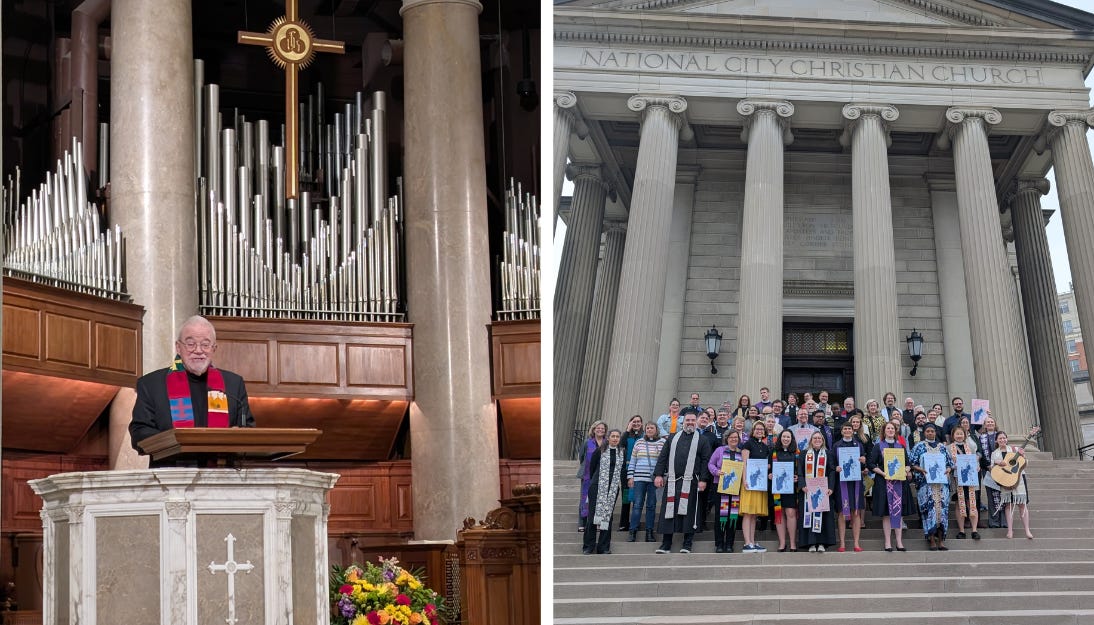
Left: Jim Wallis speaks during a vigil at National City Christian Church in Washington, D.C., on April 3, 2025. Right: Clergy gather on the steps of the church before the vigil’s start. (Brian Kaylor/Word&Way)
“We gather together,” Wallis said, “in the spirit of faith, justice, and moral courage. On the eve of this historic hearing … we stand together [as] people of different faiths, traditions, and backgrounds, all united in a sacred purpose to bear witness to the dignity and humanity of every person, especially those who are most vulnerable in our current communities.”
“This is our faith. And this is just the latest example of how people of faith will be standing up and speaking out in this moral moment,” he added. “Across the country, communities of faith are coming together in prayer, protest, and prophetic public witness — refusing to remain silent in the face of injustice. We know this movement will not just continue but will grow in strength.”
As faith leaders plead their cases in courtrooms and church sanctuaries, this issue of A Public Witness goes inside the “Sensitive Locations, Sacred Spaces Prayer Vigil” to look at the faithful effort to block ICE raids in houses of worship.
Making the Case
The lawsuit in question, Mennonite Church USA et al. v. U.S. Department of Homeland Security et al., was filed by 27 religious groups on Feb. 11. It’s an effort to protect houses of worship from immigration raids after the Trump administration rescinded a policy barring operations by ICE agents in “sensitive” or “protected” places like houses of worship and schools. Joining the Mennonites in the suit were several other mainline Protestant groups like the African Methodist Episcopal Zion Church, Christian Church (Disciples of Christ), Church of the Brethren, Episcopal Church, General Assembly of the Presbyterian Church (U.S.A.), and some regional United Church of Christ and United Methodist Church bodies. Additional plaintiffs include a Hispanic Baptist convention in Texas, multiple Jewish groups, the Unitarian Universalist Association, and the state council of churches for Massachusetts, New York, North Carolina, Rhode Island, and Wisconsin.
The lawsuit is the second by religious groups challenging the Department of Homeland Security for removing its prohibition on operations in protected places. Several associations of Quaker congregations filed a suit on Jan. 27. On Feb. 4, the Cooperative Baptist Fellowship and the Sikh Temple of West Sacramento, California, joined as parties to the case.
In the Quaker suit, U.S. District Judge Theodore Chuang issued a preliminary injunction on Feb. 24 that bars ICE agents from conducting warrantless raids in or near congregations affiliated with the plaintiffs. The judge rejected a request for a national injunction shielding all houses of worship, but still granted it for the Quaker and CBF congregations along with the Sikh Temple to block ICE while the case is pending since he found it likely the plaintiffs will succeed on the merits. He wrote that the new Trump administration policy’s “lack of any meaningful limitations or safeguards on such activity likely does not satisfy these constitutional and statutory requirements as to plaintiffs.” He added that “a return to the status quo is therefore warranted until the exact contours of what is necessary to avoid unlawful infringement on religious exercise are determined later in this case.”
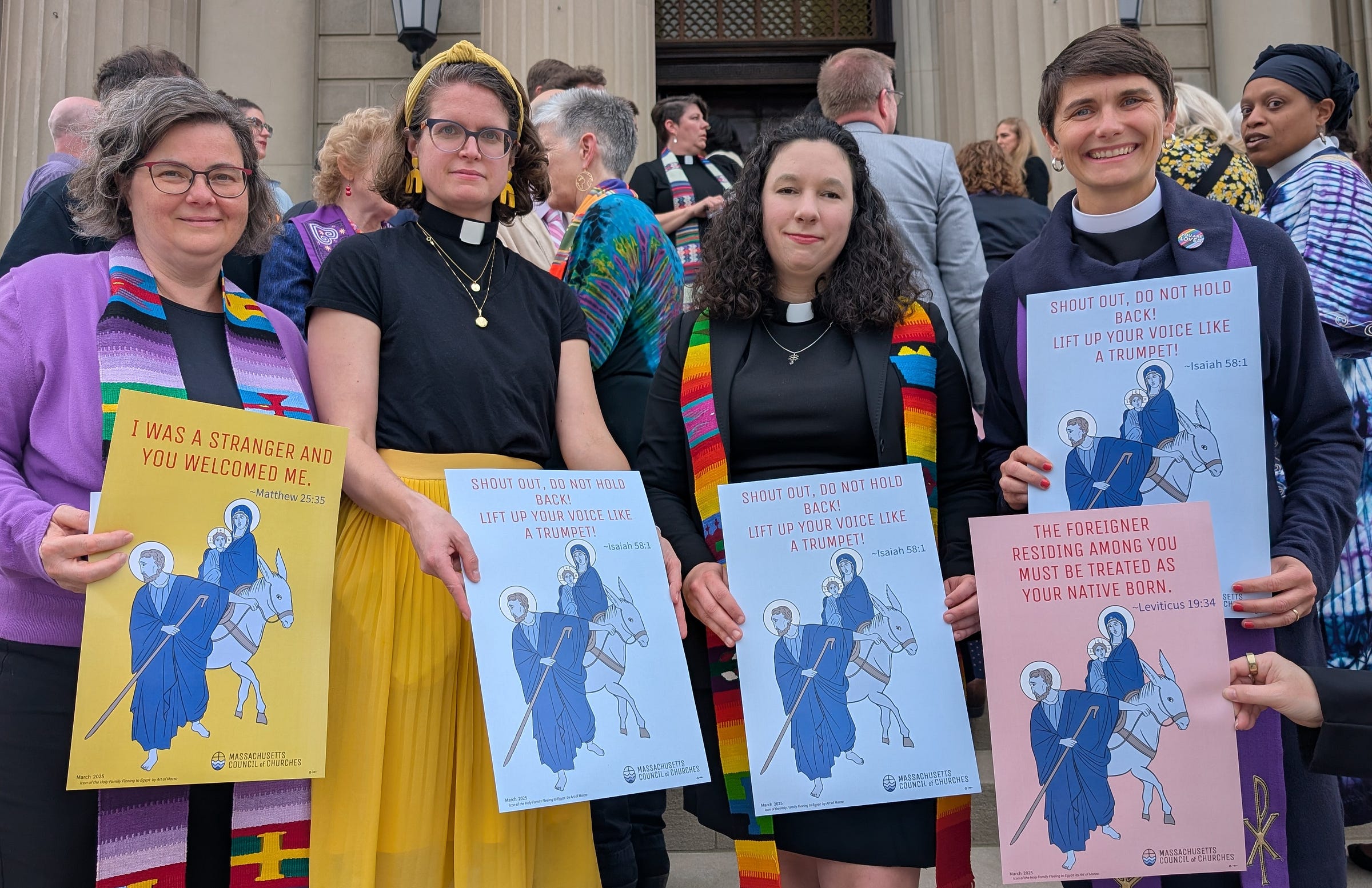
Clergy hold signs at National Christian Church in Washington, D.C., just before the start of a vigil on April 3, 2024. (Brian Kaylor/Word&Way)
Despite that injunction, there has been an incident that impacted a CBF-affiliated ministry. On March 18, a dozen unmarked law enforcement vehicles arrived in the parking lot of a church that serves as the site of English as a Second Language classes offered by Welcome House, which is a ministry of CBF North Carolina. U.S. Marshals entered the church to inform the church’s secretary they were there for a stakeout.
When Welcome House staff learned of it, they were alarmed since people would be arriving soon for an ESL class at that church. So they quickly canceled the class to protect those who would be coming in case they were the targets. Wyatt, who hasn’t identified the impacted church in hopes of protecting people, added that the ministry also contacted other ESL locations to warn them about the incident.
“What we take away from yesterday is that we need to be compassionately vigilant,” Marc Wyatt, director of Welcome House Raleigh, said afterward. “For us, this is a wake-up call as we continue to help new immigrants in our country learn to speak English, to share space with them and to love them.”
Larry Hovis, executive coordinator of CBF North Carolina, also expressed his concerns about federal agents using a partner congregation’s property for surveillance.
“Churches are supposed to be safe spaces for us to share God’s word and God’s love. I’m grateful that no one was harmed but I am concerned for the sanctity of this church and others who are involved in serving our state,” he said. “I’m also grateful for the court order that protects our churches to minister to their neighbors without the fear of warrantless raids for immigration enforcement.”
While the injunction given to CBF, Quakers, and a Sikh Temple remains in place, the 27 religious groups who filed the second case had to wait much longer to receive a hearing about obtaining a similar preliminary injunction. Their case also sits before a different federal judge. Judge Dabney Friedrich was nominated to the bench by President Donald Trump during his first term. On Friday morning after the vigil at National City Christian Church, she heard oral arguments on the motion, but then took it under advisement with a ruling to come.
‘How Can We Be Silent’
Like Jim Wallis, many of the speakers at Thursday’s vigil emphasized biblical commands that they and their congregations welcome immigrants and show God’s love to the least of these. And for them, this includes suing the government.
“God’s radical love requires us to say ‘no’ to anything that dehumanizes another person and to be committed to work at dismantling systems that abuse the most vulnerable,” declared Rev. Iris de León-Hartshorn of the Mennonite Church USA. “We need to reimagine a new strategy that continues to speak to power and unveil the truth. We cannot stand against hate and darkness with just words.”
Insisting that “love is a verb,” de León-Hartshorn said that people of faith “cannot keep silent.” She then recited the refrain from “How Can We Be Silent” that’s in the Mennonite hymnal her church uses: “None can stop the Spirit burning now inside us.”
Sister Ellis McCulloh of Network Lobby similarly argued that “the rescinding of ‘sensitive locations’ represents a crisis of morality. It compels us to speak with conviction.” And as Rev. Leslie Copeland-Tune of the National Council of Churches prayed, she noted God “created us in your image and likeness, the Imago Dei, the Imago D-E-I.” She added, “God, we come before you grateful for your word that reminds us you are a God of justice and that you care about the most vulnerable and call us to do the same. … We pray that our sacred spaces would be covered and that our neighbors would be protected.”
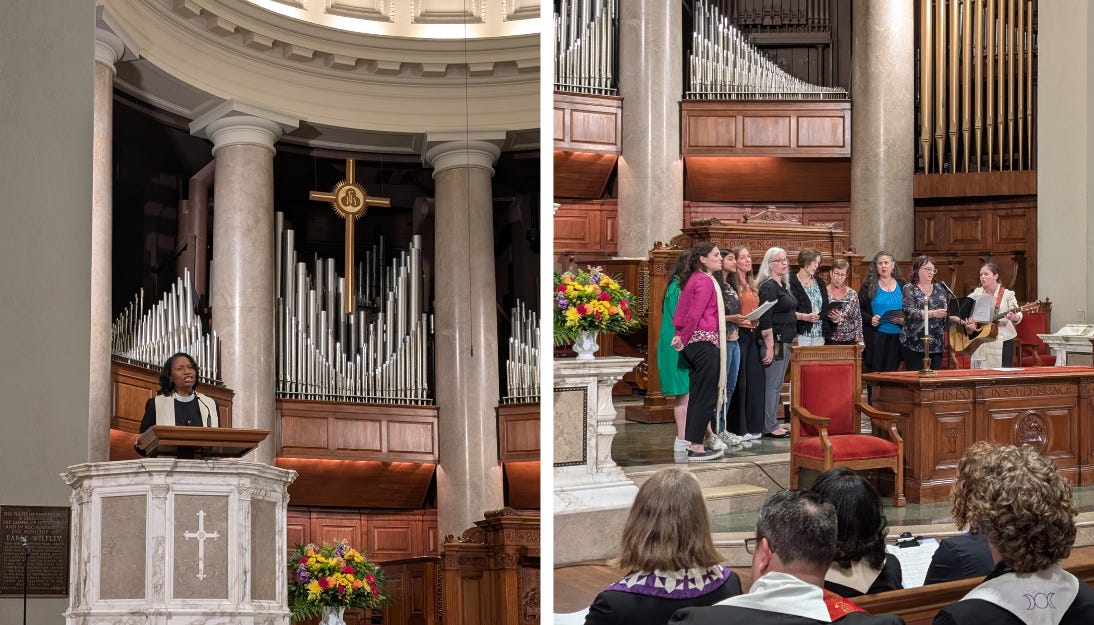
Left: Rev. Leslie Copeland-Tune speaks during a vigil at National City Christian Church in Washington, D.C., on April 3, 2025. Right: Rabbi Liz Hirsch (on guitar) leads the Women of Reform Judaism Choir as they sing during the vigil. (Brian Kaylor/Word&Way)
Rev. Carlos Malavé of the Latino Christian National Network also spoke about the justice of a liberating God. Yet, while he made comparisons to the struggle in the Book of Exodus for the liberation of the Hebrew people, he noted a key difference for Latinos in the U.S. since “unlike the Hebrew people in Egypt, we don’t want to leave this country; this is our home.” He added, “We and our children will continue to make this country truly great.” Thus, Malave made clear that the case in a federal court in D.C. is actually part of a bigger mission.
“What we are fighting for today is not only for respect or for due process and respect for human rights, but we are fighting for the end of a system that has historically exploited the vulnerable,” he said. “We will confront the Pharoah of our time. And we will even confront the detractors in our own Christian family. We will do so with courage and faith, trusting in our God.”
In between prayers, Scripture readings, and reflections, the service included songs like “Lord Prepare Me to Be a Sanctuary,” “Let There Be Love,” and “If I Had a Hammer.” Additionally, a responsive liturgy included the interfaith congregation of clergy and activists declaring to immigrants: “We will make a place for you.” Though the fate of the case rests in the hands of judges, the crowd buzzed with excitement that they were doing something to push back and they were doing it together. As the call-and-response throughout the service went, “We need each other.”
As a public witness,
Brian Kaylor
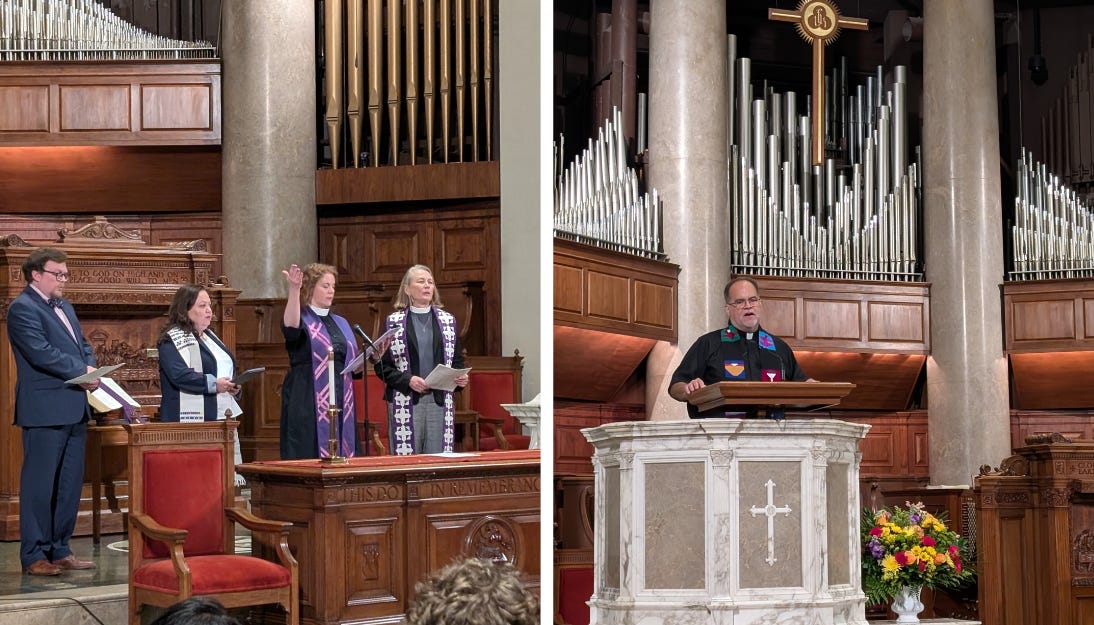
Left: A responsive liturgy is during a vigil at National City Christian Church in Washington, D.C., is led by Rev. Jeremy Langill of the Rhode Island State Council of Churches, Rev. Anyra Cano of Fellowship Southwest, Rev. Laura Everett of the Massachusetts Council of Churches, and Rev. Jennifer Copeland of the North Carolina Council of Churches on April 3, 2025. Right: Rev. Carlos Malavé speaks during the vigil. (Brian Kaylor/Word&Way)

